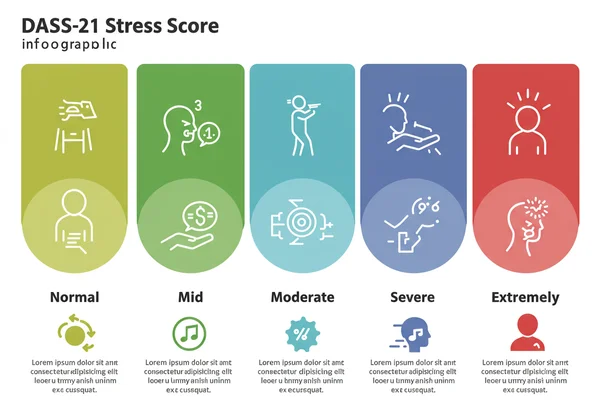उच्च DASS-21 तनाव स्कोर? सामना करने और प्रबंधित करने के 10 कदम
September 2, 2025 | By Evelyn Reed
क्या आपको DASS-21 तनाव में उच्च स्कोर मिला है और आप अभिभूत महसूस कर रहे हैं? गहरी साँस लें। आप अकेले नहीं हैं; यह संख्या सिर्फ एक शुरुआती बिंदु है, अंतिम निर्णय नहीं। कई लोग तीव्र दबाव का अनुभव करते हैं, और इसे समझना प्रभावी प्रबंधन का पहला कदम है। तो, अपने DASS21 परिणामों के साथ क्या करें? यह मार्गदर्शिका आपके स्कोर की व्याख्या करने, तनाव को नियंत्रित करने और आपकी भलाई को सशक्त बनाने के लिए व्यावहारिक कदम—तत्काल और दीर्घकालिक—प्रदान करती है। आपकी आत्म-जागरूकता की यात्रा अब हमारे मुफ्त DASS21 टेस्ट के साथ शुरू होती है।
आपके उच्च DASS-21 तनाव स्कोर को समझना: इसका क्या अर्थ है
समाधानों पर आगे बढ़ने से पहले, यह समझना महत्वपूर्ण है कि आपका DASS-21 स्कोर क्या दर्शाता है। इसे पिछले सप्ताह आपकी भावनात्मक स्थिति के एक स्नैपशॉट के रूप में सोचें। डिप्रेशन एंग्जायटी स्ट्रेस स्केल (DASS-21) पर एक उच्च तनाव स्कोर यह दर्शाता है कि आप घबराहट, आराम करने में कठिनाई तथा आसानी से उत्तेजित या चिड़चिड़ा महसूस करने जैसे लक्षणों का अनुभव कर रहे हैं। आपका शरीर और मन यह संकेत दे रहे होंगे कि मांगें आपके वर्तमान सामना करने के संसाधनों से अधिक हो रही हैं। यह मूल्यवान जानकारी है जो आपके अगले कदमों का मार्गदर्शन कर सकती है।
DASS-21 तनाव स्कोर की व्याख्या कैसे की जाती है
DASS-21 स्कोर को गंभीरता के स्तरों में वर्गीकृत करता है: सामान्य, हल्का, मध्यम, गंभीर और अत्यधिक गंभीर। एक उच्च स्कोर आपको बस उच्च श्रेणियों में से एक में रखता है, यह सुझाव देता है कि तनाव के लक्षण आपके दैनिक जीवन को महत्वपूर्ण रूप से प्रभावित कर रहे हैं। यह उन भावनाओं को समझने में मदद करता है जो अक्सर अस्पष्ट और भारी लगती हैं। गंभीरता जानने से आपको कार्रवाई करने के लिए प्रेरित किया जा सकता है, चाहे इसका मतलब आत्म-सहायता तकनीकों को लागू करना हो या पेशेवर मार्गदर्शन प्राप्त करना हो। हमारी साइट पर विस्तृत DASS 21 स्कोर व्याख्या इन स्तरों का स्पष्ट विवरण प्रदान करती है।

क्या उच्च तनाव स्कोर सामान्य है? स्क्रीनिंग को निदान से अलग करना
आज की तेज़-तर्रार दुनिया में, तनाव का अनुभव करना अविश्वसनीय रूप से सामान्य है। उच्च स्कोर प्राप्त करना असामान्य नहीं है, लेकिन इसे नज़रअंदाज़ नहीं किया जाना चाहिए। यह याद रखना महत्वपूर्ण है कि DASS-21 एक अत्यधिक विश्वसनीय स्क्रीनिंग टूल है, न कि नैदानिक उपकरण। यह आपको यह नहीं बता सकता कि आपको कोई दीर्घकालिक तनाव विकार है या नहीं। एक योग्य स्वास्थ्य सेवा पेशेवर ही एक व्यापक मूल्यांकन के बाद औपचारिक निदान प्रदान कर सकता है। DASS 21 मूल्यांकन को एक सहायक चेक-इन के रूप में सोचें, बहुत कुछ एक थर्मामीटर की तरह जो आपको बताता है कि आपको बुखार है या नहीं, लेकिन इसका कारण नहीं बताता।
तत्काल राहत: उच्च तनाव से निपटने के लिए 5 त्वरित कदम
जब आपको लगे कि आप अपनी हद पार कर रहे हैं, तो आपको ऐसे उपकरणों की आवश्यकता होती है जो तुरंत काम करें। ये पाँच रणनीतियाँ तीव्र तनाव को कम करने और आपको शांत स्थिति में वापस लाने के लिए डिज़ाइन की गई हैं। वे सरल, त्वरित हैं और लगभग कहीं भी किए जा सकते हैं।
ग्राउंडिंग तकनीकें: त्वरित माइंडफुलनेस और गहरी साँस लेना
जब तनाव के कारण आपका मन भागने लगे, तो ग्राउंडिंग आपके ध्यान को वर्तमान क्षण में वापस लाती है। "5-4-3-2-1" विधि का प्रयास करें: पाँच चीज़ों को पहचानें जिन्हें आप देख सकते हैं, चार चीज़ों को जिन्हें आप छू सकते हैं, तीन चीज़ों को जिन्हें आप सुन सकते हैं, दो चीज़ों को जिन्हें आप सूंघ सकते हैं, और एक चीज़ को जिसे आप स्वाद ले सकते हैं। इसके बाद गहरी पेट की साँस लें: अपनी नाक से चार गिनती तक धीरे-धीरे साँस लें, चार तक रोकें, और अपने मुँह से छह तक धीरे-धीरे साँस छोड़ें। यह आपके शरीर की विश्राम प्रतिक्रिया को सक्रिय करता है।

शारीरिक मुक्ति: गति, खिंचाव, या प्रोग्रेसिव मसल रिलैक्सेशन
तनावपूर्ण ऊर्जा शरीर में फँस जाती है। इसे शारीरिक रूप से जारी करने से तत्काल राहत मिल सकती है। उठें और पाँच मिनट की तेज़ चाल चलें, अपनी डेस्क पर कुछ सरल गर्दन और कंधे के खिंचाव करें, या प्रोग्रेसिव मसल रिलैक्सेशन (PMR) का प्रयास करें। PMR के लिए, एक मांसपेशी समूह (जैसे आपके हाथ) को पाँच सेकंड के लिए व्यवस्थित रूप से कसें, फिर दस सेकंड के लिए तनाव को पूरी तरह से छोड़ दें। तनाव को दूर करने के लिए विभिन्न मांसपेशी समूहों के माध्यम से आगे बढ़ें।
अपने वातावरण को बदलना: एक अस्थायी व्याकुलता
कभी-कभी, सबसे सरल समाधान दृश्यों का परिवर्तन होता है। यदि आप एक स्थान पर अभिभूत महसूस कर रहे हैं, तो दूसरे स्थान पर चले जाएँ। ताज़ी हवा के लिए बाहर निकलें, एक अलग कमरे में जाएँ, या बस अपनी कुर्सी को खिड़की की ओर मोड़ लें। अपने भौतिक वातावरण को बदलने से मानसिक बदलाव भी हो सकता है, जिससे तनावपूर्ण विचारों का चक्र टूट जाता है। एक छोटा ब्रेक लेना आत्म-नियमन का एक शक्तिशाली रूप है।
अपनी इंद्रियों को संलग्न करें: संवेदी इनपुट की शक्ति
अपनी इंद्रियों को सक्रिय रूप से संलग्न करना आपके दिमाग को तनावों से दूर खींच सकता है। एक कप हर्बल चाय बनाएँ और उसकी गर्माहट और सुगंध पर ध्यान केंद्रित करें। शांतिपूर्ण संगीत का एक टुकड़ा या प्रकृति की आवाज़ों की प्लेलिस्ट सुनें। अपने हाथ में एक चिकना पत्थर या मुलायम कपड़े का एक टुकड़ा पकड़ें। यह संवेदी जुड़ाव आपको वर्तमान में केंद्रित रखता है, जिससे चिंतित विचारों के लिए हावी होना कठिन हो जाता है।
इसे लिखें: अपनी चिंताओं को बाहरी करें
अपने दिमाग में चल रही हर चीज़ को लिखने के लिए दो मिनट का समय लें। यह अभ्यास, जिसे अक्सर "ब्रेन डंप" कहा जाता है, आपकी चिंताओं को आपके सिर से कागज़ पर उतार देता है। इसे व्यवस्थित या अच्छी तरह से लिखा होना ज़रूरी नहीं है। अपने विचारों को बाहरी करने का कार्य उन्हें अधिक प्रबंधनीय और कम भारी महसूस कराता है। उन्हें लिखा हुआ देखने से आपको उन विशिष्ट समस्याओं की पहचान करने में भी मदद मिल सकती है जिन्हें आप हल करना शुरू कर सकते हैं।
लचीलापन बनाना: तनाव प्रबंधन के लिए 5 दीर्घकालिक रणनीतियाँ
जबकि तत्काल सामना करने के कौशल आवश्यक हैं, दीर्घकालिक लचीलापन बनाना तनाव को स्थायी रूप से प्रबंधित करने की कुंजी है। ये पाँच रणनीतियाँ एक ऐसी जीवनशैली बनाने पर ध्यान केंद्रित करती हैं जो जीवन के दबावों से बचाने में मदद करती है। ये आदतें आपको नियमित dass21 स्व-मूल्यांकन से मिलने वाली अंतर्दृष्टि को पूरक करती हैं।
आत्म-देखभाल को प्राथमिकता देना: नींद, पोषण और व्यायाम
गुणवत्तापूर्ण नींद, पोषण और व्यायाम मानसिक और शारीरिक स्वास्थ्य के लिए बुनियादी हैं। प्रति रात 7-9 घंटे की गुणवत्तापूर्ण नींद का लक्ष्य रखें, क्योंकि आराम भावनात्मक विनियमन के लिए महत्वपूर्ण है। अपने शरीर को साबुत खाद्य पदार्थों से भरपूर संतुलित आहार से पोषण दें, क्योंकि पोषक तत्वों की कमी तनाव के लक्षणों को बढ़ा सकती है। अंत में, अपनी दिनचर्या में नियमित शारीरिक गतिविधि को शामिल करें—अधिकांश दिनों में केवल 30 मिनट का मध्यम व्यायाम भी तनाव के स्तर को काफी कम कर सकता है।

प्रभावी समय प्रबंधन और सीमाएँ निर्धारित करना
दीर्घकालिक तनाव का एक प्रमुख स्रोत अपने समय और जिम्मेदारियों पर नियंत्रण की कमी महसूस करना है। समय प्रबंधन तकनीकों को लागू करें जैसे कि टू-डू सूची बनाना, आइजनहावर मैट्रिक्स (तत्काल/महत्वपूर्ण) का उपयोग करके कार्यों को प्राथमिकता देना, या पोमोडोरो तकनीक का उपयोग करके ध्यान केंद्रित करना। उतना ही महत्वपूर्ण है सीमाएँ निर्धारित करना सीखना। जब आप पहले से ही अपनी क्षमता पर हों तो अतिरिक्त प्रतिबद्धताओं के लिए "नहीं" कहना स्वार्थी नहीं है; यह आपकी भलाई की रक्षा के लिए आवश्यक है।
सकारात्मक संबंध और सामाजिक समर्थन विकसित करना
मनुष्य सामाजिक प्राणी हैं, और मजबूत संबंध तनाव के लिए एक शक्तिशाली समाधान हैं। दोस्तों, परिवार और प्रियजनों के लिए समय निकालें जो आपको ऊपर उठाते हैं। एक विश्वसनीय व्यक्ति के साथ अपनी भावनाओं को साझा करने से सत्यापन और परिप्रेक्ष्य मिल सकता है। यदि आपका समर्थन नेटवर्क छोटा है, तो किसी क्लब में शामिल होने, स्वयंसेवा करने, या किसी साझा रुचि या अनुभव के इर्द-गिर्द केंद्रित एक सहायता समूह खोजने पर विचार करें।
स्वस्थ सामना करने की क्रियाविधि और समस्या-समाधान कौशल विकसित करना
भावनात्मक भोजन या टालमटोल जैसी अस्वास्थ्यकर आदतों की ओर मुड़ने के बजाय, सकारात्मक सामना करने की क्रियाविधि विकसित करें। इसमें किसी शौक में शामिल होना, ध्यान का अभ्यास करना, जर्नलिंग करना, या प्रकृति में समय बिताना शामिल हो सकता है। इसके अलावा, अपने समस्या-समाधान कौशल को बढ़ाएँ। जब किसी तनाव का सामना करना पड़े, तो उसे तोड़ें: समस्या को स्पष्ट रूप से परिभाषित करें, बिना किसी निर्णय के संभावित समाधानों पर विचार करें, सबसे व्यवहार्य विकल्प का चयन करें, और इसे लागू करने के लिए एक छोटा कदम उठाएँ।
अपने तनाव के लिए पेशेवर सहायता कब लेनी चाहिए
आत्म-सहायता शक्तिशाली है, लेकिन कभी-कभी यह पर्याप्त नहीं होती है। यह शक्ति का संकेत है कि आप पहचानें कि आपको पेशेवर सहायता की आवश्यकता कब है। यदि आपका तनाव दीर्घकालिक है, आपके काम या रिश्तों में बाधा डालता है, सिरदर्द या पेट की समस्याओं जैसे शारीरिक लक्षणों का कारण बनता है, या यदि आप निराशा महसूस करते हैं, तो किसी चिकित्सक या परामर्शदाता से मदद लेने पर विचार करें। आपके मुफ्त dass21 परीक्षण के परिणाम उस महत्वपूर्ण बातचीत के लिए एक उत्कृष्ट प्रारंभिक बिंदु हो सकते हैं।

तनाव प्रबंधन की आपकी यात्रा अब Dass21.com के साथ शुरू होती है
उच्च DASS-21 तनाव स्कोर प्राप्त करना कोई झटका नहीं है; यह एक मूल्यवान जानकारी है जो आपको सार्थक कार्रवाई करने के लिए सशक्त बनाती है। अब आपके पास दस ठोस रणनीतियाँ हैं—तत्काल राहत के लिए पाँच और दीर्घकालिक लचीलापन बनाने के लिए पाँच—जो आपको जीवन की चुनौतियों को अधिक प्रभावी ढंग से नेविगेट करने में मदद करेंगी। याद रखें कि तनाव का प्रबंधन एक सतत अभ्यास है, न कि एक बार का समाधान।
ज्ञान परिवर्तन की दिशा में पहला कदम है। अपनी भावनात्मक स्थिति को समझकर, आप इसे करुणा और कौशल के साथ संबोधित करना शुरू कर सकते हैं। अपनी भावनात्मक स्थिति को बेहतर ढंग से समझने के लिए तैयार हैं? आज ही अपना मूल्यांकन शुरू करें। अपनी भलाई पर नियंत्रण रखें और अधिक संतुलित जीवन की ओर अपनी यात्रा शुरू करें।
DASS-21 तनाव स्कोर और प्रबंधन के बारे में अक्सर पूछे जाने वाले प्रश्न
यदि मेरा तनाव स्कोर उच्च है तो मुझे अपने DASS-21 परिणामों के साथ क्या करना चाहिए? उच्च स्कोर को आत्म-चिंतन और कार्रवाई के लिए एक प्रेरणा के रूप में देखा जाना चाहिए। सबसे पहले, तीव्र भावनाओं को प्रबंधित करने के लिए इस लेख में उल्लिखित तत्काल सामना करने की रणनीतियों का उपयोग करें। फिर, लचीलापन बनाने के लिए दीर्घकालिक रणनीतियों को लागू करने पर विचार करें। सबसे महत्वपूर्ण बात, आगे के मार्गदर्शन के लिए अपने परिणामों को एक विश्वसनीय स्वास्थ्य सेवा प्रदाता या मानसिक स्वास्थ्य पेशेवर के साथ साझा करने पर विचार करें।
क्या DASS-21 परीक्षण तनाव के लिए एक नैदानिक उपकरण है? नहीं। DASS-21 एक वैज्ञानिक रूप से मान्य स्क्रीनिंग टूल है जिसे अवसाद, चिंता और तनाव से संबंधित लक्षणों की गंभीरता को मापने के लिए डिज़ाइन किया गया है। यह मूल्यवान अंतर्दृष्टि प्रदान करता है लेकिन एक व्यापक मूल्यांकन के बाद एक योग्य पेशेवर से औपचारिक निदान का विकल्प नहीं हो सकता।
तनाव का आकलन करने के लिए DASS-21 स्केल कितना विश्वसनीय है? DASS-21 एक व्यापक रूप से सम्मानित और बड़े पैमाने पर शोध किया गया मनोवैज्ञानिक उपकरण है। इसने विभिन्न आबादी में कई अध्ययनों में मजबूत विश्वसनीयता और वैधता दर्शाई है, जिससे यह भावनात्मक संकट के लक्षणों के प्रारंभिक स्व-मूल्यांकन के लिए एक विश्वसनीय उपकरण बन गया है।
तनाव के लिए DASS-21 परीक्षण लेने से किसे लाभ हो सकता है? जो कोई भी अपनी भावनात्मक भलाई की बेहतर समझ प्राप्त करने में रुचि रखता है, वह लाभान्वित हो सकता है। यह अकादमिक दबाव का सामना कर रहे छात्रों, उच्च-मांग वाली नौकरियों में पेशेवरों और जीवन संक्रमणों से गुजर रहे व्यक्तियों के लिए विशेष रूप से सहायक है। हमारा ऑनलाइन dass21 प्लेटफॉर्म 15 से अधिक भाषाओं में उपलब्ध है, जो इसे दुनिया भर के लोगों के लिए एक त्वरित, गोपनीय भावनात्मक स्वास्थ्य जांच प्राप्त करने के लिए एक सुलभ उपकरण बनाता है।